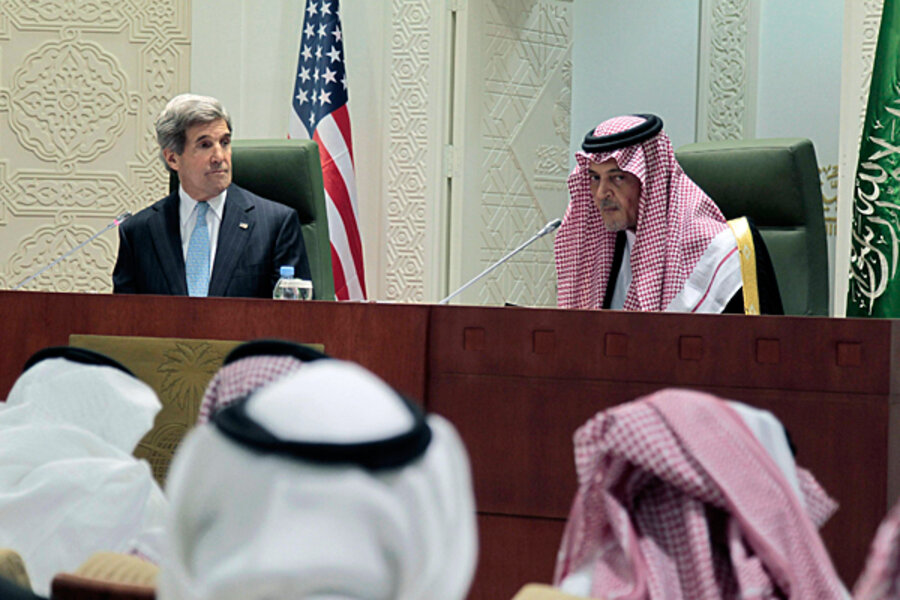Iran nuclear talks: Saudis, IAEA, voice doubt over Tehran's intentions
Loading...
| Washington
The head of the United Nations nuclear watchdog agency charged Iran Monday with using delaying tactics to put off inspection of a key military research site – just hours after Saudi Arabia’s foreign minister told Secretary of State John Kerry that Iran’s only interest in nuclear talks is “further negotiation” to give its nuclear program more time.
The comments by the International Atomic Energy Agency (IAEA) director general, Yukiya Amano, in Geneva and by Saudi Prince Saud al-Faisal in Riyadh served as a kind of reality check after a flurry of optimism about resolving Iran’s nuclear crisis diplomatically that followed a round of talks last week between Iran and a group of world powers including the United States.
Secretary Kerry, who was in Riyadh Sunday as part of an 11-day overseas trip, said at a news conference that “there is a finite amount of time” for negotiations to resolve differences over Iran’s advancing uranium enrichment program. Both the US and Saudi Arabia prefer a diplomatic solution, Kerry said, adding that “the window for a diplomatic solution … cannot remain open indefinitely.”
But Prince Faisal admonished international powers not to be fooled by what he said is Iran’s deliberate lack of “urgency” in pursuing international talks. “We can’t be like the philosophers who keep talking about how many angels a pinhead can hold,” he said.
Two days of talks last week between Iran and six world powers – the US, China, Russia, Britain, France, and Germany – ended on a note of relative optimism after the two sides agreed to pursue further technical negotiations in March, with a return to political-level talks in April.
Iran judged the talks in Almaty, Kazakhstan, a “turning point” in the years-long standoff between the two sides, while one State Department official traveling with Kerry told reporters the US was “encouraged” by the discussions.
The world powers want Iran to suspend operation of its underground enrichment site in Fardow and to give up most of its stockpile of 20 percent enriched uranium – a more highly processed material than power-generation-grade uranium. which can be quickly transformed into weapons-grade fuel. In exchange, Iran would receive some relief from the biting sanctions the international community has imposed on Iran’s economy.
But skeptics have been quick to point out that Iran has seemed to be moving toward accords on its nuclear program in the past – only to back off before actually sealing the deal.
Mr. Amano, the IAEA executive director, may have had one such about-face in mind when he told the agency’s board of governors Monday that Iran should agree to international inspections of its key military research complex “without further delay.”
Amano said Iran had failed to provide “credible assurance” that it is not hiding undeclared nuclear materials or pursuing military aims with its nuclear program at its Parchin military complex.
“The agency therefore cannot conclude that all nuclear material in Iran is in peaceful activities,” he said.
Last summer Iran agreed to inspections to be carried out by the IAEA at the Parchin complex. But Iran subsequently reversed itself and slammed the door on inspections as details for the inspections were being worked out.
Some nuclear nonproliferation experts say the world powers negotiating with Iran are focusing on the key threats in Iran’s nuclear program: the stockpile of 20 percent enriched uranium, and the Fardow underground facility that could potentially put Iran’s nuclear operations out of reach of airstrikes – and thus increase Israel’s nervousness in particular over Iran’s nuclear progress.
But even some nuclear weapons analysts who hold out hope for a negotiated settlement say the coming weeks aren’t likely to be propitious for overcoming mutual distrusts and reaching an accord.
President Obama is set to visit Israel before the end of the month – a trip that both US and Israeli officials agree is likely to be dominated by Iran.
Then Iran will hold presidential elections in June – leading some regional experts to conclude that an incremental agreement that leaves open a number of major issues in Iran’s nuclear program is about the best anyone can expect from the current round of talks.
That raises the question of whether such an incremental accord would be enough to keep open Kerry’s “window for a diplomatic solution.”






